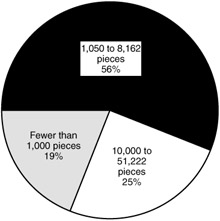How Much Fragmentation Occurs in NTFS?
|
| < Day Day Up > |
|
Just how much fragmentation occurs in NT and Windows 2000? For those doubters still clinging to the belief that these operating systems either do not fragment or effectively minimize fragmentation, try this experiment. Install a new version of the OS and MS Office, and then run an analysis of fragmentation. You might be surprised by the extent of fragmentation, especially for NTFS. The results of such an experiment are supported by a fragmentation study conducted on 100 companies (ranging from small to large). This survey revealed that 56 percent of NT/Windows 2000 workstations had files fragmented into between 1,050 and 8,162 pieces. One in four reported finding files with as many as 10,000 to 51,222 fragments. For servers, an even greater degree of fragmentation exists. Half of the respondents discovered 2,000 to 10,000 fragments, and another 33 percent had files fragmented into 10,333 to 95,000 pieces. Although rare, it is possible to find the occasional file splintered into hundred of thousands and even millions of pieces (see Exhibit 1).
Exhibit 1: Fragmentation on NT and Windows 2000 Workstations

Detractors, however, argue that the performance hit from fragmentation is canceled out by a number of modern features. Disks come equipped with read-ahead and seek optimization technology, queued I/O requests are reordered to minimize head movement and revolution-time stalls, and a file-based cache bypasses disk access on commonly used files. Defragmentation vendors, on the other hand, counter with claims of increased speed and system performance, citing horror stories of crippled servers that take 30 minutes to boot up, only to move with the rapidity of frozen molasses. So, who's right?
|
| < Day Day Up > |
|
EAN: N/A
Pages: 197